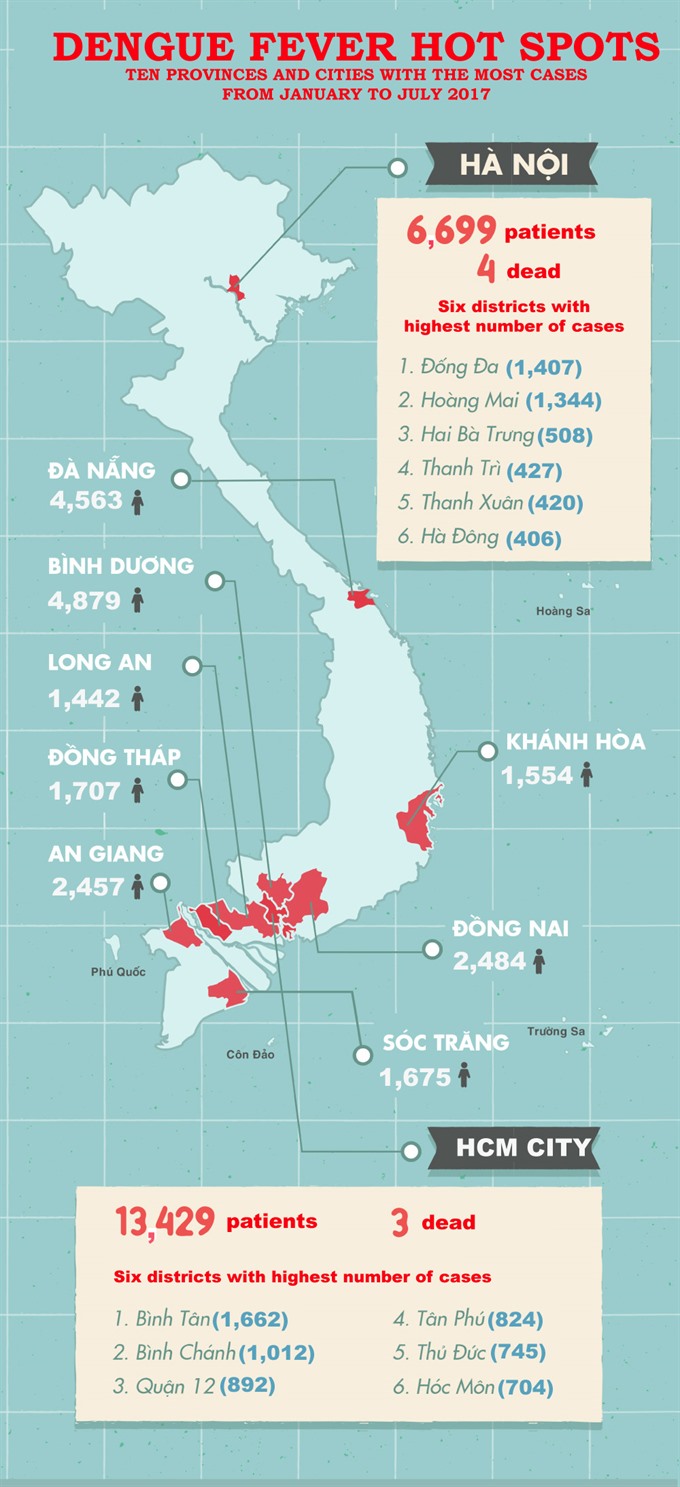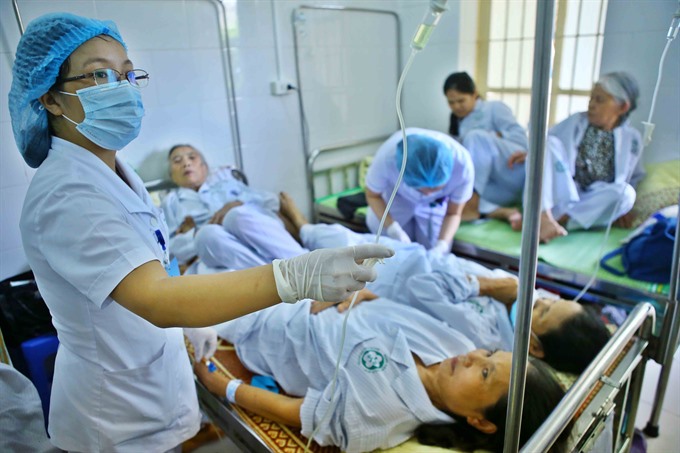 Society
Society
.jpg)
The rainy season is a peak time for infectious diseases, and the last few weeks have seen a surge in the number of patients with dengue fever.
 |
| Source: Health Ministry’s Department of Preventive Medicine, Hà Nội and HCM City’s departments of health. Designed by news.zing.vn |
Khánh Dương
HÀ NỘI – The rainy season is a peak time for infectious diseases, and the last few weeks have seen a surge in the number of patients with dengue fever.
According to the Health Ministry’s Department of Preventive Medicine, more than 58,000 people have contracted dengue fever in the first seven months of this year, a year-on-year increase of 11.2 per cent.
Of these, 49,000 were admitted to hospitals, and 18 lost their lives. The latest fatality was in the southern province of Đồng Nai last Saturday.
There has also been an increase in other diseases and conditions like malaria, diarrhea, skin allergies and conjunctivitis (red eye).
In the capital city’s Láng Thượng Ward, Đống Đa District, an area where a lot of rooms are rented out is a dengue fever hotspot. Rubbish and water tanks can be seen at every corner in the area. Local residents see keeping the common spaces clean as someone else’s job.
Trần Thanh Tùng, a tenant, said everyone should do the job. “If it is only me who cleans up, it won’t be effective.”
In Bình Chánh District, a dengue fever hotspot in HCM City, the water tanks in some households have mosquito larva. Liquid waste tanks are not fully covered. Residents took action only after inspection teams from the municipal Health Department paid a visit.
In some cases, local authorities feel helpless. At the Chùa Láng cemetery, flower vases are cemented to the graves, making it impossible to remove the vases and get rid of stagnant water.
Trần Đắc Phu, head of Department of Preventive Medicine said that the dengue fever outbreak happened earlier than normal this year.
Most cases were still in the South (64.4 per cent), followed by the central region (19.9 per cent). The infection rate was lower in the North, but it is only entering peak time now.
“Dengue fever has broken out strongly in Hà Nội with over 1,000 cases each week. Without proper control and mobilization of sectors and residents, this number may increase rapidly,” he said.
Urban challenge
Doctor Ngũ Duy Nghĩa, deputy head of the Epidemiology Department at the National Institute of Hygiene and Epidemiology in Hà Nội, said that besides tropical weather conditions, the high speed of urbanisation was a major reason for many rainy season diseases spreading widely.
Disease prevention had not been carried out strictly at construction sites, factories and workers’ tents, he said.
“In our experience, awareness of residents in the outskirts is better. In inner cities, residents tend not to cooperate well with authority. They tend to be unaware of disease prevention…,” he told Việt Nam News.
However, Professor Vũ Sinh Nam, also of the National Institute of Hygiene and Epidemiology, said that Hà Nội had basically implemented dengue fever prevention activities in full.
Leaders of healthcare departments and units had initiated preventive measures at all levels, but the disease continued to spread, he said.
He said dengue fever prevention work had proven ineffective not only in Hà Nội and Việt Nam, but also in other countries in the region and the world that have seen outbreaks.
“While local authorities at city and district levels are anxious about the epidemic’s complicated occurrence, those at ward, commune and hamlet levels are yet to pay due attention. They think that it is the job of the medical sector,” he said.
He said the involvement of local authorities was very important. In some urban areas, quite a few households do not agree to allow city staff to spray chemicals in their houses. In such situations, local authorities need to step in.
Another challenge, said Professor Nam, was the thin medical force in charge of a large number of outbreak sites. The number of staff instructed by professionals was very small. Others were low-paid hired workers working in toxic environments. This meant that the spraying had not been done properly, in terms of the process as well as the quantity sprayed, he said.
He also said while a lot of people get involved in the larvae killing campaigns, only a small number were equipped with skills to spot areas where the mosquitoes lay their eggs. Sometimes, even after an area was found, it was not treated well.
Public involvement
“I want to emphasize that dissemination plays an important part in raising awareness and this must be done regularly. Medical staff can only instruct others.
“Residents must understand that they themselves are the main force. Each resident is a warrior, each house a fortress,” Doctor Nghĩa said.
"While authorities support the public with forecasting and prevention activities, they cannot remind residents every day. Prevention cannot be effective if residents are not aware or don’t take responsibility for hygiene in their homes and surrounding areas," he added.
The need for people’s involvement was also stressed by Deputy Prime Minister Vũ Đức Dam when he visited dengue hotspots in Hà Nội last weekend. He reiterated that local authorities could not clean up and keep reminding residents round the clock.
“Preventive measures are not new but we have to drastically apply them,” the Deputy PM said.
“I’ve inspected Hà Nội, but also want to mention other provinces with a lot of construction sites. Investors must be penalized if they do not act after information about prevention has been disseminated,” he added.
Professor Nam said supervision must be stepped up to detect infections early and isolate outbreak sites in time to prevent the epidemic from spreading.
Sprayers, chemicals, medicines, human resources as well as funding should be mobilised at all levels for responding to emergencies, he said.
“In outskirt districts, we should establish quick response teams including local militia, youth, students, farmers, veterans and Red Cross Associations, and conduct training on identifying and treating mosquito larva sites.
“This work is more difficult in inner districts and ward. But we should also set up quick response teams here in co-operation with local authorities.”
Nguyễn Nhật Cảm, director of Hà Nội’s Preventive Medicine Centre said “We have been working with universities and colleges to raise students’ awareness. Landlords renting rooms have to sign commitments with local People’s Committees on ensuring hygiene.”
“This year we have penalized individuals and organizations for hygiene violations.
“In Mai Dịch Ward, Cầu Giấy District, we recently fined an enterprise dealing in used tires VNĐ2million (US$87). Such penalties aim to raise awareness of disease prevention.” -- VNS
 |
| Patients with dengue fever undergo treatment at the Communicable Diseases Department of Bạch Mai Hospital in Hà Nội. — VNA/VNS Photo Minh Quyết |
.jpg)



